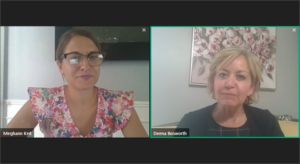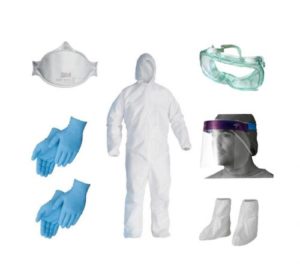Legislature backs nearly $1 billion for COVID responses
 A large infusion of aid for local governments, first responders and health workers lacks only Gov. Gretchen Whitmer’s signature after the Legislature approved Senate Bill 690 this week.
A large infusion of aid for local governments, first responders and health workers lacks only Gov. Gretchen Whitmer’s signature after the Legislature approved Senate Bill 690 this week.
The bill, by Sen Jim Stamas (R-Midland), includes $880 million drawn from federal revenue allocated to Michigan through the CARES Act that established a $150 billion fund for state and local governments.
(Learn more about the legislation via a video episode of Podcast 83.)
Of this sum, local governments that didn’t receive direct federal aid would get $200 million. To receive funds, counties must submit by July 17 their public safety and public health payroll expenditures for the months of April and May. Expenditures are not eligible if they have been, or will be, reimbursed by any other federal funds (FEMA, HHS, DOJ, etc.).
Another $100 million is set aside for hazard pay for first responders. For these funds, counties must apply for payment or reimbursement through the Michigan Department of Treasury by Sept. 30. Payments and reimbursements will be made on a first-come, first-served basis. Eligible employees include law enforcement officers, firefighters, emergency medical technicians, paramedics, 911 operators, local corrections officers, airport public safety officers and ambulance operations personnel.
Direct care workers, including those in county medical care facilities, will see a $2 per hour temporary increase beginning July 1 and running through Sept. 30. The $120 million set aside for this also will cover costs incurred by the employer, including payroll taxes, due to the increase. Eligible workers include registered nurses, licensed practical nurses, competency-evaluated nursing assistants and respiratory therapists.
Other key elements in the bill are:
- $25 million in grants for PPE, testing and testing equipment to priority providers
- $60 million for a rental assistance program
- $155 million in small business restart grants
- $29 million for additional unemployment insurance agency employees
- $1.4 million for the Bureau of Community and Health Systems to conduct COVID-19 infection control surveys in medical care facilities
The bill was sent to the governor for final approval, and she has released a statement of support, while also alluding to additional relief in the future:
“While it is good news that more than $850 million is now appropriated for additional relief across the state, much more work lies ahead to ensure that schools and local communities will have the funding and resources they need.”
For more information on this issue, contact Deena Bosworth at bosworth@micounties.org.
 Podcast 83 discusses eventful legislative week
Podcast 83 discusses eventful legislative week
Deena Bosworth and Meghann Keit of MAC’s Governmental Affairs Team run down an eventful week in Lansing in a video episode of Podcast 83, MAC’s podcast on all news and things county-related in Michigan.
To view the newest episode, visit the Podcast 83 page on the MAC website.
Virtual options under Open Meetings Act extended to July 31
 County boards can continue to hold public meetings remotely under the Open Meetings Act due to a new order signed by Gov. Gretchen Whitmer Thursday night. Executive Order 129 extends a previous EO allowing such meetings during the ongoing COVID-19 pandemic to July 31, 2020.
County boards can continue to hold public meetings remotely under the Open Meetings Act due to a new order signed by Gov. Gretchen Whitmer Thursday night. Executive Order 129 extends a previous EO allowing such meetings during the ongoing COVID-19 pandemic to July 31, 2020.
“As we continue our efforts to flatten the curve and prevent a second wave of COVID-19, it’s important for public bodies to be able to continue holding meetings and the public to participate in those meetings,” Governor Whitmer said in a statement. “By allowing for remote meetings, public bodies and residents can continue practicing safe social distancing while also ensuring meetings remain open, accessible and transparent to the public.”
Public bodies must meet the following criteria when holding a public meeting remotely:
- Ensure two-way communication for members and the public to hear and address each other when speaking.
- Provide adequate notice to the public of the meeting.
- Post a public meeting notice on their website.
- Permit participants to record or broadcast the public meeting.
- Allow participants to address the public body during a public comment period.
For technical tips on conducting remote sessions, visit MAC’s COVID-19 Resources Page.
Senate votes to reset FY21 budget deadline
 A law requiring the Legislature to deliver a budget to the governor by July 1 would be set aside for the fiscal 2021 budget under a bill approved by the Senate this week.
A law requiring the Legislature to deliver a budget to the governor by July 1 would be set aside for the fiscal 2021 budget under a bill approved by the Senate this week.
Senate Bill 963, by Sen. Curtis Hertel Jr. (D-Ingham), would nullify the requirements of Public Act 160 of 2019 for this cycle, in deference to the effects of the COVID-19 crisis on tax collections.
The rules under PA 160 would resume next year.
The delay measure is now before the Michigan House of Representatives.
The state’s budget year starts on Oct. 1 and state leaders already agreed to hold a special Consensus Revenue Estimating Conference in August to give lawmakers a better idea of how much revenue will be available for the FY21 budget.
For more information on this issue, contact Deena Bosworth at bosworth@micounties.org.
Summer property tax deferment bills pass House
 Individuals and businesses could delay their summer 2020 property tax payments to March 1, 2021, without penalty under a two-bill package passed by the House unanimously this week.
Individuals and businesses could delay their summer 2020 property tax payments to March 1, 2021, without penalty under a two-bill package passed by the House unanimously this week.
House Bills 5761 and 5810, by Rep. James Lower (R-Ionia), state that entities wishing to delay payments must submit an affidavit to their local tax collecting unit attesting to financial hardship due to the COVID-19 pandemic by Aug. 28, 2020, to qualify. Once a local unit has collected the affidavits, it would submit those to the county for tallying and submission to the Michigan Department of Treasury. Then, it would be incumbent upon the state to borrow enough money to make up for those unpaid taxes for all the taxing units, so locals do not run in to significant cash flow issues during the deferment period.
MAC has worked closely with the bill sponsor, the Michigan Association of County Treasurers, the Michigan Chamber of Commerce and the other local government associations in the development of the legislation. Although significant progress has been made on the bills, MAC remains neutral on the legislation until such time as we have greater assurances that Treasury can and will absorb any of the costs associated with administering the program.
The bills move to the Senate and could be reviewed as early as next week.
For more information on this issue, contact Deena Bosworth at bosworth@micounties.org.
CoPro+ launches PPE Program to save counties money
 CoPro+, MAC’s cooperative purchasing program especially designed for counties and other public entities, has responded to the COVID-19 pandemic by creating a robust new program to give public entities the best possible prices and services on Personal Protective Equipment.
CoPro+, MAC’s cooperative purchasing program especially designed for counties and other public entities, has responded to the COVID-19 pandemic by creating a robust new program to give public entities the best possible prices and services on Personal Protective Equipment.
Visit the CoPro+ homepage to start learning details about the program and how it can serve your needs.
The cooperative also is expanding its social media presence. Look for information on new vendors and deals via Facebook and Instagram.
Please check back to our site regularly for new details on deals and ordering.
Ballot experts talk ‘shoebox’ voters and more on Camp Counties webinar
 Who are “shoebox voters”? What are the critical two weeks in any millage election campaign? Due to Proposal 3 of 2018 and the coronavirus pandemic, what percentage of voters are expected to cast ballots by mail in August and November?
Who are “shoebox voters”? What are the critical two weeks in any millage election campaign? Due to Proposal 3 of 2018 and the coronavirus pandemic, what percentage of voters are expected to cast ballots by mail in August and November?
These questions and more were tackled this week by Adrian Hemond and Scott Bean of Grassroots Midwest in the second of five Camp Counties webinars, “Planning and Winning Millage Elections in a COVID World.”
The webinars, supported by Enbridge, Envirologic and other corporate partners, were started to replace MAC’s regular Regional Summits, which were cancelled due to the coronavirus.
To see the election presentation, and register for upcoming events, visit the camp page on the MAC website. All webinars are free for MAC members.
State orders more COVID testing in medical homes
 New COVID testing requirements for residents of medical care facilities were ordered this week by the Michigan Department of Health and Human Services.
New COVID testing requirements for residents of medical care facilities were ordered this week by the Michigan Department of Health and Human Services.
The order, effective immediately, requires such facilities to test in the following manner:
“i. Initial testing of all residents and staff;
- Testing of all new or returning residents during intake unless tested in the last 72 hours;
iii. Testing any resident or staff member with symptoms or suspected exposure;
- Weekly testing of all residents and staff in facilities with any positive cases among residents or staff, until 14 days after the last new positive;
- Testing of all staff in Regions 1 through 5 and 7, at least once between the date of this order and July 3, 2020;
- Weekly testing of all staff in regions of medium or higher risk on the MI Safe Start Map”
To see which region your county is it, please check the MI Start map.
The order also requires facilities to complete a plan for conducting testing consistent with the above requirements, no later than June 22. The plans must be executed no later than June 29.
Failure to comply with the testing order is “subject to a $1,000 fine for each violation or for each day that a violation continues. Any violation of the order by a facility regulated by LARA shall be referred to the agency for determination whether to pursue additional enforcement action as it deems appropriate.”
Also, signed by the governor this week was an extension of “Enhanced protections for residents and staff of long-term care facilities during the COVID-19 pandemic.” EO 123 continues to require transfer to a regional hub if a dedicated unit is not available and provide requirements facilities must meet such as canceling all communal dining. The order continues through July 12.
For more information on this issue, contact Meghann Keit at keit@micounties.org.
Indigent Defense Commission approves FY21 grant contract
 An indigent services grant contract for fiscal 2021 was approved by the Michigan Indigent Defense Commission (attached) this week.
An indigent services grant contract for fiscal 2021 was approved by the Michigan Indigent Defense Commission (attached) this week.
The new contract reflects changes developed in conjunction with MAC and member counties and includes removal of the excess grant from the previous year to the total authorized budget on page 1. Removing this allows contracts to be executed in a timelier manner, as statute does not require excess funding to be reported until Oct. 31. Any unused funds will be reduced in the second and third disbursements equally.
The disbursement schedule is unchanged, with 50 percent advanced within 15 days of the executed agreement, and then two 25 percent payments on May 15 and Aug. 14 in 2021. See letter to stakeholders.
The new contract also ensures that county-commission disputes or unresolved documentation issues do not hold up funding for uncontested services or the issuance of grant contracts. Some counties have encountered problems in the past due to disputes over a couple of line items that held up the larger portion of their funding.
The commission also began its review of compliance planning and cost analysis of local systems. That work will continue at its next meeting on Aug. 18. The meeting packet can be found here. The commission meeting was also recorded and can be viewed at the commission site.
For more information on this issue, contact Meghann Keit at keit@micounties.org.
Grants available for Child/Parent Legal Representation program
 The Michigan Department of Health and Human Services (MDHHS) is inviting each circuit court that did not apply for the FY20 IV-E Child and Parent Legal Representation (CPLR) Grant to apply for the upcoming fiscal year, 2021. Grant funds will run through Sept. 30, 2021, with an effort to get a start date of those funds as close to Oct. 1, 2020, as possible.
The Michigan Department of Health and Human Services (MDHHS) is inviting each circuit court that did not apply for the FY20 IV-E Child and Parent Legal Representation (CPLR) Grant to apply for the upcoming fiscal year, 2021. Grant funds will run through Sept. 30, 2021, with an effort to get a start date of those funds as close to Oct. 1, 2020, as possible.
Through this grant, the department will make a claim for title IV-E eligible legal representation expenditures paid by the court. Eligible expenditures are costs from legal representation of a child and/or parent in child protective proceedings where at least one child is placed in out-of-home placement (foster care). MDHHS will determine the type and amount of eligible expenditures and provide the court the applicable title IV-E funds.
Note: If you have been participating in the FY20 CPLR Grant cycle or were on the original FY20 list but withdrew, please look for an email from the MDHHS-IVE-LRGrant@michigan.gov.
Your Intent to Apply for FY21 must be submitted by July 1. Courts will need to estimate the amount the county plans to spend on parent attorneys and LGALs in foster care cases in FY21, but the amount can be changed later if it needs to be.
Questions about the grant application and process may be submitted to MDHHS-IVE-LRGrant@michigan.gov.
 Staff picks
Staff picks
- America’s Biggest Park Struggles to Survive the Pandemic (Governing)
- Elections and COVID-19: A discussion between Ingham Clerk Barb Byrum and MSU Extension’s Eric Walcott (MSU Extension)
- This is your state’s favorite vegetable (Dailymeal.com)
- Why are so many people not wearing masks? Here’s how they explain it. (Los Angeles Times)
